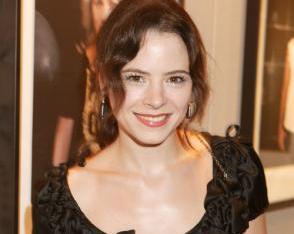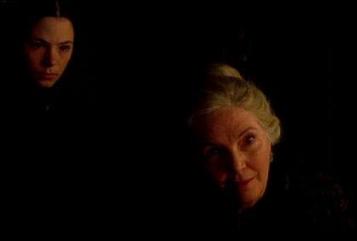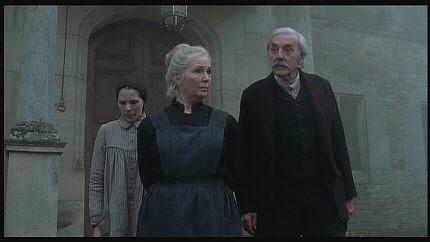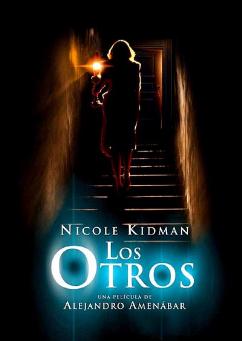|
Find interviews by: | ||
Elaine Cassidy (Part 1) I interviewed Elaine Cassidy by phone in June 2001 for a Fangoria article about Alejandro Amenabar’s ghost story The Others. As with the Eric Sykes and Christopher Eccleston interviews, this was done without any knowledge of the film which was shrouded in secrecy before release. Jump straight to Part 2 of this very long interview.
"It comes out next month, I think. I think it’s coming out in July over here. I was just thinking about it the other day: ‘Oh my God, I’ll get to see it soon.’” Was it last year that you shot it? "Yes, last summer." How did you get the role? "I was over in London for three weeks doing a workshop at the National Theatre with John Crowley. I was staying with my agent at the time because she’s really really nice and decided to put me up, we get on very well. Alejandro was over in London at the time, so she arranged to meet him. I read the script and then I met him the next day. He was really interested in me for the part, which I was delighted about. I just watched Open Your Eyes the night before and the minute I saw that, I was like, ‘Oh my God, yes. Not only do I want to meet this man but I really want to work with him.’ I was really, really delighted with how it came about." Had he seen any of your other films? "He’d seen Felicia’s Journey." What was it about the script that appealed to you? "Well, for me, you get to read so many scripts and most of them are diabolical, to put it mildly. You just know when you’ve got a good script, when it’s well written and that does most of the work for you. And the fact that he was going to be involved with it just made it a complete definite. I had to do it. I wasn't too sure what was going to happen at the end. It was suspenseful and really well written. It was gripping and got my attention. I found the story really interesting." Tell me about your character. "She’s mute. And the reason for her being mute - she wasn’t born like that - it gets explained in the film, right at the end. She’s very unstable, she’s very nervous, she’s not confident at all. She clings to Mrs Mills, who acts as a mother figure to her, more so her than the gardener. But it’s like the two of them are her family. Mrs Mills will tell her what to do and she’ll be her voice - because she can’t talk."
"I don't know if it was actually hard, but it was quite frustrating. because she wasn’t in it that much. I would have liked her to be in it a lot more. When you have more scenes, it’s easier to establish your character more than when you’ve got a smaller part. You don't get so much out in fewer scenes, so you don’t get that much information about them. Unless there’s a book or something. Also, Alejandro left it up to me to decide what way she should be played. He seemed happy enough with what I was doing, but that was quite tough for me as well. Obviously if there was something he didn’t like, he’d say, ‘No, no, I don’t like that.’ But I felt a lot of pressure. I feel very confident about how it’s going to turn out because at the end of each day he’d say, ‘Yes, I’m very happy.’ So that helped me a bit, but I didn’t get as much input from him as I would have liked. But I still really enjoyed working with him. He’s happy so I’m happy because my job is to portray the character the way he wants, and I seem to have done that. So I’ll just wait and see. I’m very cynical about myself." How did you find Nicole Kidman to work with? "I didn't have many scenes with her, but when I was on set with her she was really, really focused. She was just so confident during scenes and she really, really pushes herself. So she’s really, really good worker. From the scenes I saw her in, she was doing a really, really good job. So that’s why I can’t wait to watch it, because there’s so much that I didn’t see being filmed, so it’ll be like watching a film that I wasn’t in. But yes, she was really, really good." How did you cope working with a Spanish crew? "I would have liked to have been able to speak Spanish. I thought, ‘I’ll go over and learn Spanish,’ but everyone was just talking in English so that didn’t really happen. But there wasn’t that much difference. There were a few times when communication was a bit hard but everyone had a good level of English so it was fine. It might have been just twice when communication broke down for a few seconds and that was it. You had to explain it again in a different way. But by the end of the film, everyone’s English had improved so much. Even people who couldn’t really speak it and could only understand it - by the end of the film you were able to have conversations with them. So that was brilliant. But there wasn't much of difference on set. They were allowed to have beer and wine at lunch, but that was about it."
"No, not really. It never struck me as that. I wasn't conscious of it, but I suppose it was good to get you into that mode of thinking, for it to be dark when you walk on set. But it never struck me consciously as, ‘Oh, this is getting me in the right frame of mind.’ Although I suppose subconsciously it might have done that. When we were shooting the exterior scenes, it was very smoky because they had the smoke machines going. But because it was outside it was really difficult getting the smoke to stay. So there was a lot of waiting around for that - and it was really smelly as well. The thing I remember most about when we were in studio is that it was really, really warm because when we had the cameras rolling obviously we couldn’t have the air conditioning going. Between takes they’d put the air conditioning on, but that was the only thing." Amenabar is seen as an amazing young man, but you were one of the few people on the film even younger than him, who could look up to him. "Yes, but even so, he’s still so young. I was still completely amazed by the fact that not only did he write and was directing the film, but he was composing the music as well. He said he’d started on that. It’s just amazing that while you’re talking to him, and while he’s shooting the scenes, he had the whole film edited in his mind. He knew exactly what he needed and where to stop in each angle, because he knew what he was going to use. I just couldn’t believe that anybody could have the whole picture in his head. There’s a lot of people who would never reach his level in their lifetime. So yes, I looked up to him for that fact, but still always remembered how young he was."
"I’m learning more from each film. You’re working with different people so you learn different routines and different ways of doing things. Some directors just direct differently. So you learn a bit from each and hopefully take it on with you to the next, and hopefully it improves you. Even just being around different actors, you learn how they do what they do - so you can take what you want and leave what you want." Was Felicia’s Journey the big breakthrough for you? "Oh yes. I didn’t even know what a director was supposed to do before that! Even though that was my second one. I didn’t even know what an actor was supposed to do before that. I remember the first time I met with Bob [Hoskins], and Atom [Egoyan] was there too, and Bob was going, ‘Oh yes, I’ve been thinking about my character.’ He was just talking to Atom about it, and I thought, ‘So that’s what an actor’s supposed to do!’ I was being really conscious about it: I have to think about this and I have to think about that. Hopefully it was all going subconsciously from what Bob was doing because he was quite amazing. He’s a really instinctive actor. I remember one thing that he said on the first day was that it’s all in the eyes. If you’re not feeling it, the camera won’t know. I remember thinking, ‘What? What’s he saying? How will the camera know what you’re thinking?’ But after watching him, I realised that what he said was completely true, that you can tell if it’s being felt or if it’s acted - that there is a difference between the two. Not only that, but Felicia’s Journey also opened up so many doors to other jobs as well." As a young actress, did you have any qualms about taking a role in a fairly nasty film? "To tell you the truth, before I saw the film I thought it was a love story. So you can tell how shocked I was when I saw it! I read the book twice, but I was only looking at it from Felicia’s point of view and the information that she knew and I was skimming over everything else. In a way, without knowing what I was doing, it was probably the best way to go about it. Because she doesn’t know that he’s a serial killer. I didn’t know that it was that sort of film, but even if I had have known, it probably would have excited me even more. I knew when I read that script that it was really well written and I really wanted to get it, and thankfully I did. But yes, I was completely unaware as to how dark it was going to be." Was it a shock when you saw the film? "Yes, I didn't know what to make of it. I watched it the first few times on video. The first time was with my mum and the second time was with my friends. I was talking to Atom afterwards, when I rang him, and he was saying, ‘What did you think? What did you think?’ And I was like, ‘Yes, um...’ I can’t really lie, I just go around to avoid trying to say certain comments that I don’t want to say. Because I didn’t want to say, ‘I don't know what to make of it.’ But then when I watched it for the first time in Cannes, the first proper time that I saw it on the big screen - because I missed so much on the small screen, I realised that no, I really like it. I think I’d gotten used to it as well, so I really enjoyed it that time I watched it. Since then I think I’ve seen it ten times at whatever festival it’s been at. And each time I’ve noticed something else. But I haven’t watched it in about two years." Continue to Part 2 of this long interview, where Elaine discusses The Lost World, Disco Pigs and temping between films. | ||

 I haven’t seen
I haven’t seen  Is it easier or harder to play a mute character?
Is it easier or harder to play a mute character? What about shooting the film in semi-darkness. Any problems with shooting on dark sets?
What about shooting the film in semi-darkness. Any problems with shooting on dark sets?